译林牛津版六年级知识点整理
牛津译林版小学六年级英语上册 Unit4单元知识 总结

牛津译林版小学六年级英语上册 Unit4单元知识总结一·四会单词1.ago2.office2.office办公室3.newspaper(可数)报纸4.news 新闻5. watch 观看(动)6.e-book 电子书7.with 用;和...一起(介词)8.yesterday 昨天二.四会词组1.six years ago 六年前2.write letters写信write letters to sb 写信给某人3.in the office 在办公4.read newspapers for news读报纸获得新闻5.read e-books 读电子书6.call people 给人们打电话7.watch news观看新闻8.write emails = write an email 写电子邮件9.then and now 过去和现在10.make friends 交朋友11.listen to the radio 听广播listen to me 听我说12.on the Internet 在网上13.all over the world 全世界14.at school 在学校15.buy things from shops 从商店买东西16.be on holiday 在度假e sth to do sth 使用某物做某事use the telephone to call poople 使用电话给人们打电话18.do shopping =go shopping 购物19.work hard 努力工作20.look out of ...朝...外看21.wait for+宾格(me.him.her ) 等待...22.go on(doing sth)继续(做某事)23.get angry = be angry (形)生气24.make a sentence with ..用...造句25.in the cake 在蛋糕里26.an English lesson 一节英语课27.a mobile phone 一部手机28.an e-book 一个电子书29.six years old 六岁30.invent the train 发明火车三.四会句子1.Six years ago , Mike could read and draw ,but he could not write .六年前,迈克会阅读和画画,但是他不会写字。
牛津译林版六年级上册英语Unit1 king's new clothes 知识点复习资料
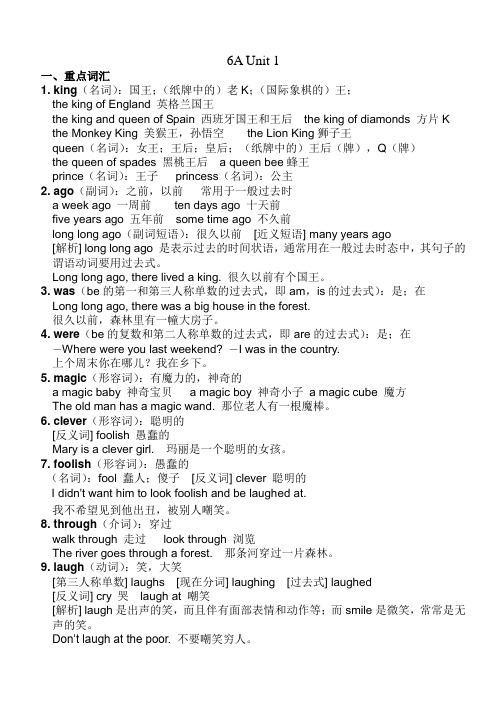
6A Unit 1一、重点词汇1. king(名词):国王;(纸牌中的)老K;(国际象棋的)王;the king of England 英格兰国王the king and queen of Spain 西班牙国王和王后the king of diamonds 方片K the Monkey King 美猴王,孙悟空the Lion King狮子王queen(名词):女王;王后;皇后;(纸牌中的)王后(牌),Q(牌)the queen of spades 黑桃王后 a queen bee蜂王prince(名词):王子princess(名词):公主2. ago(副词):之前,以前常用于一般过去时a week ago 一周前ten days ago 十天前five years ago 五年前some time ago 不久前long long ago(副词短语):很久以前[近义短语] many years ago[解析] long long ago 是表示过去的时间状语,通常用在一般过去时态中,其句子的谓语动词要用过去式。
Long long ago, there lived a king. 很久以前有个国王。
3. was(be的第一和第三人称单数的过去式,即am,is的过去式):是;在Long long ago, there was a big house in the forest.很久以前,森林里有一幢大房子。
4. were(be的复数和第二人称单数的过去式,即are的过去式):是;在-Where were you last weekend? -I was in the country.上个周末你在哪儿?我在乡下。
5. magic(形容词):有魔力的,神奇的a magic baby 神奇宝贝 a magic boy 神奇小子a magic cube 魔方The old man has a magic wand. 那位老人有一根魔棒。
牛津译林版英语六年级上册Units1-4 重难点知识归纳总结
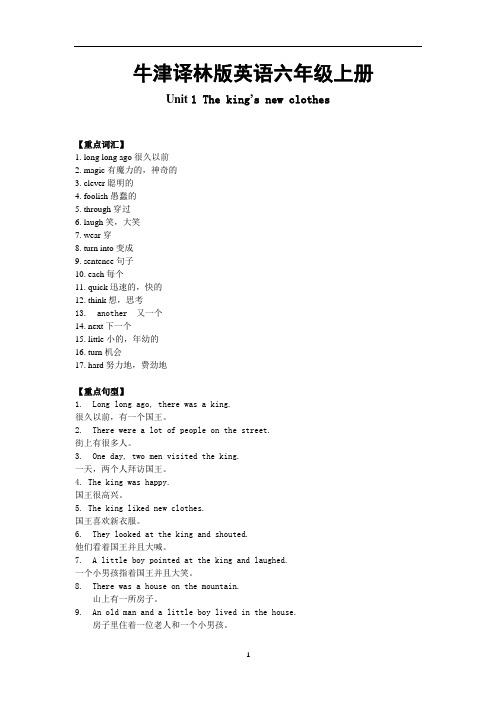
牛津译林版英语六年级上册Unit 1 The king’s new clothes【重点词汇】1. long long ago 很久以前2. magic 有魔力的,神奇的3. clever 聪明的4. foolish 愚蠢的5. through 穿过6. laugh 笑,大笑7. wear 穿8. turn into 变成9. sentence 句子10. each 每个11. quick 迅速的,快的12. think 想,思考13. another 又一个14. next 下一个15. little 小的,年幼的16. turn 机会17. hard 努力地,费劲地【重点句型】1. Long long ago, there was a king.很久以前,有一个国王。
2. There were a lot of people on the street.街上有很多人。
3. One day, two men visited the king.一天,两个人拜访国王。
4. The king was happy.国王很高兴。
5. The king liked new clothes.国王喜欢新衣服。
6. They looked at the king and shouted.他们看着国王并且大喊。
7. A little boy pointed at the king and laughed.一个小男孩指着国王并且大笑。
8. There was a house on the mountain.山上有一所房子。
9. An old man and a little boy lived in the house.房子里住着一位老人和一个小男孩。
10. The old man told the boy a story.老人给男孩讲了一个故事。
Unit 2 What a day!【重点词汇】1. sunny 晴朗的2. show 展览,展示3. interesting 有趣的,有意思的4. weather 天气5. become 变成,变为6. windy 有风的7. cloudy 多云的8. high 在高处9. honey 蜂蜜10. drink 饮料11. ant 蚂蚁12. bee 蜜蜂13. cloud 云14. rain 下雨15. rainy 多雨的16. meet 遇见17. lose 丢失18. know 知道19. climb up 爬上20. hold onto 抓紧23. fly away 飞走【重点句型】1. It was sunny/cloudy/windy/rainy.天气晴朗/多云/多风/多雨。
牛津译林版六年级上册英语全册语法知识点详解(unit1)
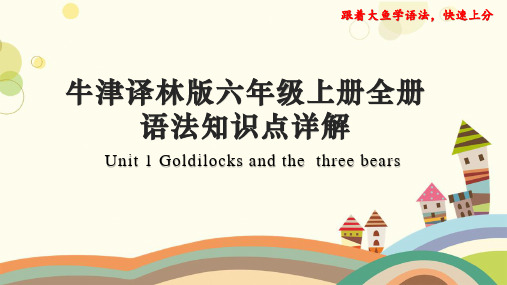
一、一般过去时的用法
(三)过去式变形规则 3. 其他动词。 (4)以“辅元辅”结尾的动词,双写这个辅音字母再加ed。如: stop→stopped、drop→dropped (5)不规则变化。如: go→went、see→saw、bring→brought、catch→caught、 sleep→slept、make→made、p)标志词 6. once(曾经);once upon a time(从前) eg: Once upon a time, the king liked new clothes. 7. last+一段时间(night/week/month/ year等) eg: We went shopping last Saturday. 8. ago(two days ago);long long ago eg: We had a picnic a week ago. 9. One day eg: One day, he got lost in the forest. 10.in +2020年以前的年份。 eg: Lily lived in Beijing in 2016.
二、现在进行时的用法
(四)注意事项 1. 根据主语单复数选用合适的be动词: 单数用is,复数用are 2. 动词ing的规则需牢记: (1)一般在动词后加ing。如:work→working、read→reading (2)以不发音的e结尾的动词,去掉e,再加ing。如:smile→smiling、write→writing。 (3)以重读闭音节结尾的且词尾只有一个辅音字母的,双写这个辅音字母加ing。常见的有: sit→sitting、stop→stopping、run→running、swim→swimming、shop →shopping。
译林牛津小学六年级英语6BU7知识点
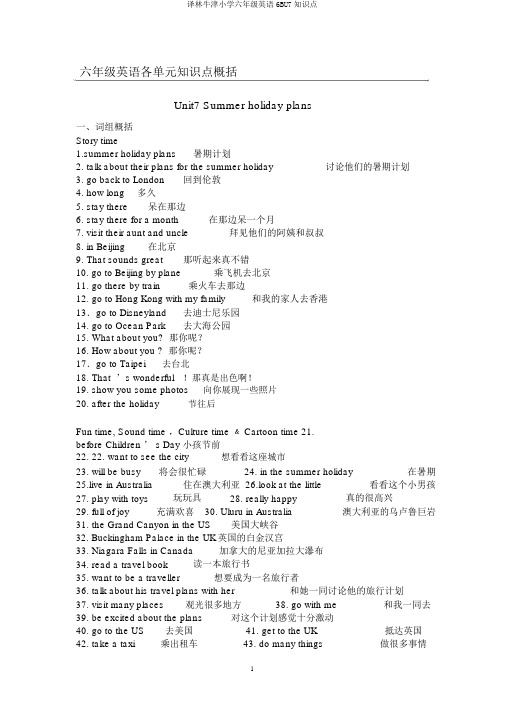
六年级英语各单元知识点概括Unit7 Summer holiday plans一、词组概括Story time1.summer holiday plans暑期计划2. talk about their plans for the summer holiday讨论他们的暑期计划3. go back to London回到伦敦4. how long多久5. stay there呆在那边6. stay there for a month在那边呆一个月7. visit their aunt and uncle拜见他们的阿姨和叔叔8. in Beijing在北京9. That sounds great那听起来真不错10. go to Beijing by plane乘飞机去北京11. go there by train乘火车去那边12. go to Hong Kong with my family和我的家人去香港13.go to Disneyland去迪士尼乐园14. go to Ocean Park去大海公园15.What about you? 那你呢?16.How about you ? 那你呢?17.go to Taipei去台北18. That ’s wonderful!那真是出色啊!19. show you some photos向你展现一些照片20. after the holiday节往后Fun time, Sound time ,Culture time ﹠ Cartoon time 21.before Children ’ s Day 小孩节前22. 22. want to see the city想看看这座城市23. will be busy将会很忙碌24. in the summer holiday在暑期25.live in Australia住在澳大利亚 26.look at the little看看这个小男孩27. play with toys玩玩具28. really happy真的很高兴29. full of joy充满欢喜 30. Uluru in Australia澳大利亚的乌卢鲁巨岩31. the Grand Canyon in the US美国大峡谷32. Buckingham Palace in the UK英国的白金汉宫33. Niagara Falls in Canada加拿大的尼亚加拉大瀑布34. read a travel book读一本旅行书35. want to be a traveller想要成为一名旅行者36. talk about his travel plans with her和她一同讨论他的旅行计划37. visit many places观光很多地方38. go with me和我一同去39. be excited about the plans对这个计划感觉十分激动40. go to the US去美国41. get to the UK抵达英国42. take a taxi乘出租车43. do many things做很多事情144. have a wonderful summer holiday有一个出色的假期二、要点句型 1. 你假期打算去哪儿?我打算去香港。
译林牛津六年级Culture time 知识整理
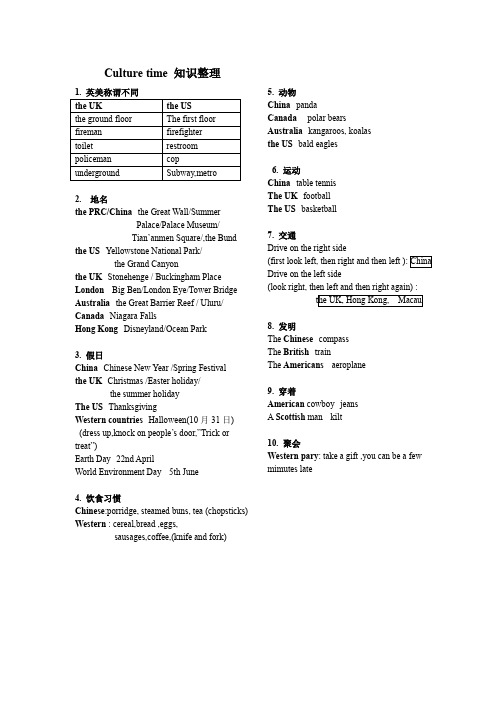
3. 假日 China--Chinese New Year /Spring Festival the UK--Christmas /Easter holiday/
the summer holiday The US--Thanksgiving Western countries--Halloween(10 月 31 日)
the UK, Hong Kong, Macau
8. 发明 The Chinese--compass The British--train The Americans-- aeroplane
9. 穿着 American cowboy--jeans A Scottish man --kilt
10. 聚会 Western pary: take a gift ,you can be a few mimutes late
(dress up,knock on people’s door,”Trick or treat”) Earth Day--22nd April World Environment Day --5th June
4. 饮食习惯 Chinese:porridge, steamed buns, tea (chopsticks) Western : cereal,bread ,eggs,
牛津译林版六年级英语上册第一单元6A Unit2词汇和句型知识点

6A Unit 2 What a day!一、词组1.go to the park by bike 骑自行车去公园2.go to school on foot/walk to school步行去上学3.become cloudy 变得多云4.look sad 看起来难过5.what a day怎样的一天啊st Sunday 上周日7.this Sunday 这周日8.next Sunday 下周日9.a parrot show 一场鹦鹉表演10.fly kites high in the sky把风筝放到高高的空中11.many black clouds许多乌云12.some interesting parrots 一些有趣的鹦鹉13.go away 走开14.fly away飞走15.want to know 想要知道16.near the hill 在小山附近17.bring some drinks 带来一些饮料18.fly too high 飞得太高19.in your diary 在你的日记里20.write about …写关于……21.cheer together 一起欢呼22.hold onto it紧紧抓住它23.lose my new kite 丢失我的新风筝24.lose one’s way 迷路25.bring lunch to the park带午餐去公园26.watch a film 看电影27.a busy day忙碌的一天28.go swimming去游泳29.climb up the hill爬上小山30. meet him in the park在公园遇见他31.time for lunch该吃午饭了32. pick three cards 挑选三张卡片e again another day改天再来34. on a rainy morning 在一个雨天的早上35.on Monday afternoon在周一下午36.do housework做家务37.find my English book找到我的英语书38.have a picnic on the grass在草地上野餐二、句型1. I get up at six every morning. But this morning, I got up at six thirty.我每天六点起床。
译林牛津英语6A知识点
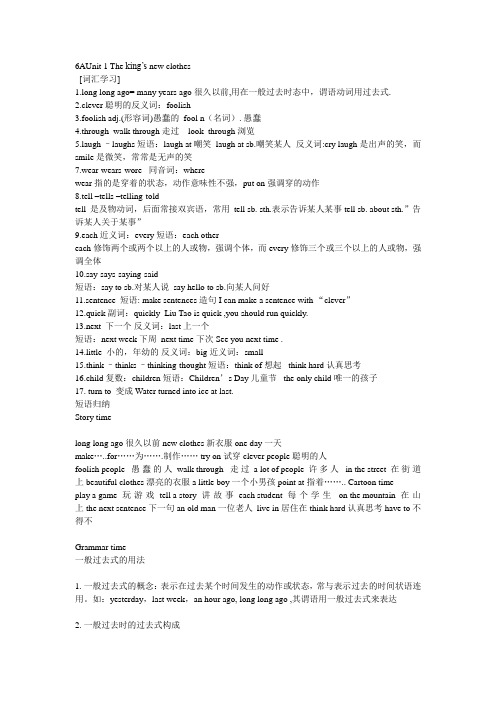
6AUnit 1 The king’s new clothes[词汇学习]1.long long ago= many years ago很久以前,用在一般过去时态中,谓语动词用过去式.2.clever 聪明的反义词:foolish3.foolish adj.(形容词)愚蠢的 fool n(名词). 愚蠢4.through walk through走过 look through浏览ugh –laughs 短语:laugh at 嘲笑 laugh at sb.嘲笑某人反义词:cry laugh 是出声的笑,而smile 是微笑,常常是无声的笑7.wear-wears-wore 同音词:wherewear指的是穿着的状态,动作意味性不强,put on 强调穿的动作8.tell –tells –telling-toldtell是及物动词,后面常接双宾语,常用tell sb. sth.表示告诉某人某事 tell sb. about sth.”告诉某人关于某事”9.each 近义词:every 短语:each othereach修饰两个或两个以上的人或物,强调个体,而every修饰三个或三个以上的人或物,强调全体10.say-says-saying-said短语:say to sb.对某人说 say hello to sb.向某人问好11.sentence 短语: make sentences 造句I can make a sentence with “clever”12.quick 副词:quickly Liu Tao is quick ,you should run quickly.13.next 下一个反义词:last 上一个短语:next week下周 next time 下次 See you next time .14.little 小的,年幼的反义词:big 近义词:small15.think –thinks –thinking-thought 短语:think of想起 think hard 认真思考16.child复数:children 短语:Children’s Day儿童节 the only child 唯一的孩子17. turn to 变成 Water turned into ice at last.短语归纳Story timelong long ago 很久以前 new clothes 新衣服 one day 一天make…..for……为…….制作…… try on试穿 clever people聪明的人foolish people愚蠢的人 walk through走过 a lot of people 许多人in the street 在街道上 beautiful clothes漂亮的衣服 a little boy 一个小男孩 point at指着…….. Cartoon timeplay a game 玩游戏 tell a story 讲故事 each student 每个学生on the mountain 在山上 the next sentence 下一句 an old man 一位老人live in 居住在 think hard 认真思考 have to 不得不Grammar time一般过去式的用法1. 一般过去式的概念:表示在过去某个时间发生的动作或状态,常与表示过去的时间状语连用。
牛津译林版小学六年级英语上册 Unit6 单元知识 总结
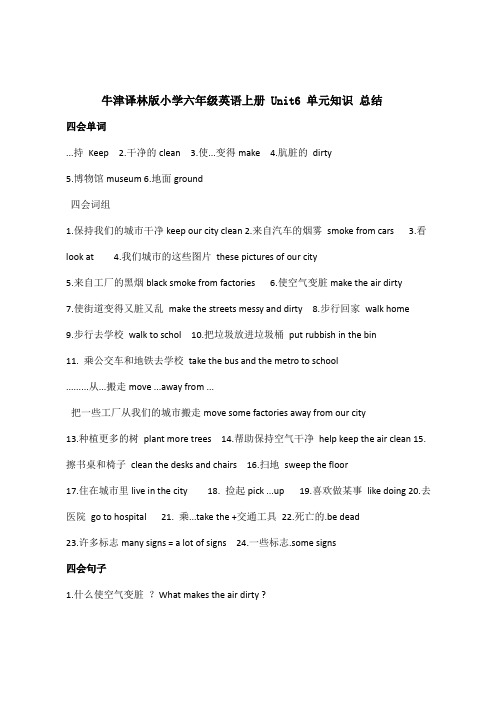
牛津译林版小学六年级英语上册 Unit6 单元知识总结四会单词...持Keep 2.干净的clean 3.使...变得make 4.肮脏的dirty5.博物馆museum6.地面ground四会词组1.保持我们的城市干净keep our city clean2.来自汽车的烟雾smoke from cars3.看look at4.我们城市的这些图片these pictures of our city5.来自工厂的黑烟black smoke from factories6.使空气变脏make the air dirty7.使街道变得又脏又乱make the streets messy and dirty 8.步行回家walk home 9.步行去学校walk to schol 10.把垃圾放进垃圾桶put rubbish in the bin11. 乘公交车和地铁去学校take the bus and the metro to school .........从...搬走move ...away from ...把一些工厂从我们的城市搬走move some factories away from our city13.种植更多的树plant more trees 14.帮助保持空气干净help keep the air clean 15.擦书桌和椅子clean the desks and chairs 16.扫地sweep the floor17.住在城市里live in the city 18. 捡起pick ...up 19.喜欢做某事like doing 20.去医院go to hospital 21. 乘...take the +交通工具22.死亡的.be dead23.许多标志many signs = a lot of signs 24.一些标志.some signs四会句子1.什么使空气变脏?What makes the air dirty ?烟雾使空气变脏。
牛津中小学英语六年级上册 第二单元知识点整理

译林6A Unit 2知识点整理一、单词(见书后92页)二、词组:1. 骑车去公园go to the park by bike= ride to the park2. 鹦鹉表演 a parrot show3.一个有趣的鹦鹉an interesting parrot4. 变得有风且多云become windy and cloudy5.高高地放飞风筝fly kites high6. 在天空中in the sky7.带来一些饺子bring some dumplings 8. 一些面包和蜂蜜some bread and honey 9.一些饮料some drink s10. 一些蜜蜂some bees11.看见一些蚂蚁在面包和蜂蜜上see some ants on the bread and honey12.乌云密布black cloud s 13. 一些白云some white clouds14.天下起了雨。
It rained. 15. 又饥饿又潮湿hungry and wet16.整天all day 17. 带午饭到公园bring lunch to the park 18.取三张卡片pick three cards 19. 在操场上打篮球play basketball in the playground 20.干得好well done 21. 遇见Bobby meet Bobby22.看起来伤心look sad 23. 怎么了?What’s the matter?24.丢失了我的新风筝lose my new kite 25. 想知道为什么want to know why26.出什么事了?What happened? 27. 放我的新风筝fly my new kite28.爬上山climb up the hill 29. 飞得太高fly too high30.抓紧风筝hold onto the kite 31. 飞走fly away32.为什么你有它?Why do you have it? 33. 在山边发现它find it near the hill34.在你的日记里in your diary 35. 去游泳go swimming36.看电影watch a film 37. 去野餐have a picnic38.做家务do the housework 39. 在星期一上午on Monday morning40.上周星期天last Sunday 41.(在)9月20日(on) the 20th of September三、句子41.这是怎样的一天啊What a day!42.这是有趣的一天啊What an interesting day!43.昨天天气怎么样?What was the weather like yesterday?44.昨天天气晴朗。
新版译林英语六年级知识点

一、单词及短语1. 动物:cat,dog,elephant,panda等2. 食物:apple,banana,cake,cookie等3. 家庭成员:father,mother,sister,brother等4. 学科:Chinese,math,English,science等5. 交通工具:car,bus,train,bicycle等7. 体育项目:soccer,basketball,swimming,cycling等8. 问候语:Hello,Good morning,How are you?等9. 数字:one,two,three,four等10. 时间:morning,afternoon,evening等二、语法1.简单句和复合句的区别:简单句由主语和谓语构成,而复合句由主语、谓语和一个或多个宾语、定语、状语等构成。
2. 一般现在时:表示经常性的动作或现在的状态,例如:I go to school every day.3. 一般过去时:表示过去发生的动作或状态,例如:He watched a movie last night.4. 一般将来时:表示将来要发生的动作或状态,例如:We will have a party next week.5. 祈使句:用于表达请求、命令等,例如:Sit down, please.6. 疑问句:用于提问,例如:What's your name?7. 指代代词:表示代替前面提到的人或物,例如:This is my bag.I love it.三、阅读理解1.任务型阅读理解:要求学生根据问题来阅读短文,并回答相关问题。
2.完形填空:要求学生根据上下文的意义和语法规则来填写合适的单词,使整个短文内容完整。
3.回答问题:要求学生仔细阅读短文,并回答问题,对理解短文的主旨和细节有一定要求。
牛津译林版六年级英语上册第六单元unit6 知识汇总
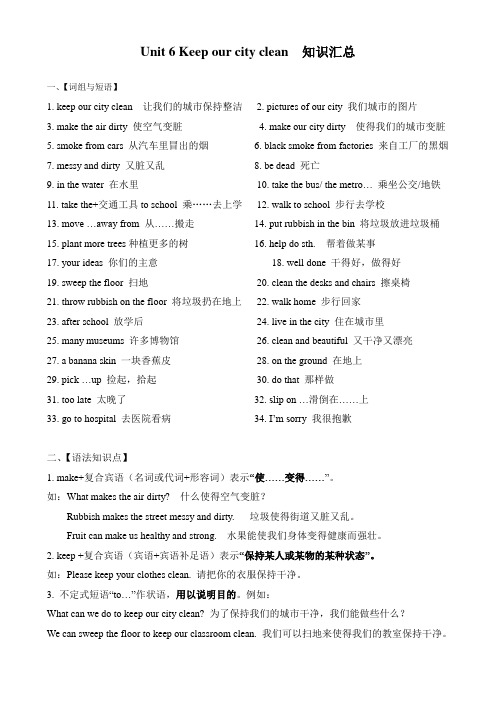
Unit 6 Keep our city clean 知识汇总一、【词组与短语】1. keep our city clean 让我们的城市保持整洁2. pictures of our city 我们城市的图片3. make the air dirty 使空气变脏4. make our city dirty 使得我们的城市变脏5. smoke from cars 从汽车里冒出的烟6. black smoke from factories 来自工厂的黑烟7. messy and dirty 又脏又乱8. be dead 死亡9. in the water 在水里10. take the bus/ the metro…乘坐公交/地铁11. take the+交通工具to school 乘……去上学12. walk to school 步行去学校13. move …away from 从……搬走14. put rubbish in the bin 将垃圾放进垃圾桶15. plant more trees种植更多的树16. help do sth. 帮着做某事17. your ideas 你们的主意18. well done 干得好,做得好19. sweep the floor 扫地20. clean the desks and chairs 擦桌椅21. throw rubbish on the floor 将垃圾扔在地上22. walk home 步行回家23. after school 放学后24. live in the city 住在城市里25. many museums 许多博物馆26. clean and beautiful 又干净又漂亮27. a banana skin 一块香蕉皮28. on the ground 在地上29. pick …up 捡起,拾起30. do that 那样做31. too late 太晚了32. slip on …滑倒在……上33. go to hospital 去医院看病34. I’m sorry 我很抱歉二、【语法知识点】1. make+复合宾语(名词或代词+形容词)表示“使……变得……”。
英语译林(牛津)版英语六年级上册知识点整理.doc
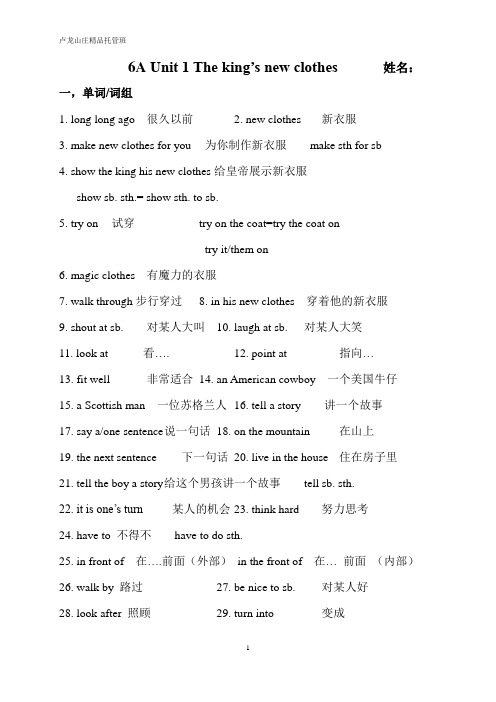
卢龙山庄精品托管班6A Unit 1 The king’s new clothes姓名:一,单词/词组1. long long ago 很久以前2. new clothes 新衣服3. make new clothes for you 为你制作新衣服make sth for sb4. show the king his new clothes给皇帝展示新衣服show sb. sth.= show sth. to sb.5. try on 试穿try on the coat=try the coat ontry it/them on6. magic clothes 有魔力的衣服7. walk through步行穿过8. in his new clothes 穿着他的新衣服9. shout at sb. 对某人大叫10. laugh at sb. 对某人大笑11. look at 看….12. point at 指向…13. fit well 非常适合14. an American cowboy 一个美国牛仔15. a Scottish man 一位苏格兰人16. tell a story 讲一个故事17. say a/one sentence 说一句话18. on the mountain 在山上19. the next sentence 下一句话20. live in the house 住在房子里21. tell the boy a story 给这个男孩讲一个故事tell sb. sth.22. it is one’s turn 某人的机会 23. think hard 努力思考24. have to 不得不have to do sth.25. in front of 在….前面(外部)in the front of 在… 前面(内部)26. walk by 路过27. be nice to sb. 对某人好28. look after 照顾29. turn into 变成二,句型1. Long long ago, there was a king. 很久很久以前,有一位国王。
2023六年级英语下册Unit1Thelionandthemouse知识点梳理译林牛津版

Unit 1 The lion and the mouse知识点梳理Key phrases:large and strong大和强壮 laugh happily开心地大笑walk by路过 sweet shop甜品店wake …up 唤醒Aesop’s Fables伊索寓言want to eat the mouse想要吃老鼠some day 某一天 be good at table tennis乒乓打得好so small and weak这么小和弱 cheer for them loudly大声地为他们喝彩let the mouse go 让这只老鼠走开 hit the ball hard用力击球catch the lion with a large net用一张大网抓住狮子find a hole in the ground在地上发现一个洞bite the net with his sharp teeth用它的厉牙咬网 too deep太深get out from the net破网而出 reach it(到达)触碰到它Just then就在那时 have an idea有一个主意(想法)make a big hole in the net在网上做了一个大洞 bring some water quickly 很快带来一些水from then on从那时起 pour it into the hole把它倒进洞bee good friends变成好友 In a shopping centre在一个购物中心help the lion get out帮助狮子逃脱 look sad看起来伤心ask sadly伤心地问 help him up帮他上来laugh loudly大声地笑 go to him去他那里say quietly平静地说 take him to an office带他到一个办公室say happily高兴地说 give him a sweet给他一块糖a happy boy 一个快乐地男孩 like helping people喜欢帮助人Key sentences:1. The lion was angry and wanted to eat the mouse.这只狮子很生气想要吃那只老鼠。
(完整版)译林牛津六年级上学期英语语法总结
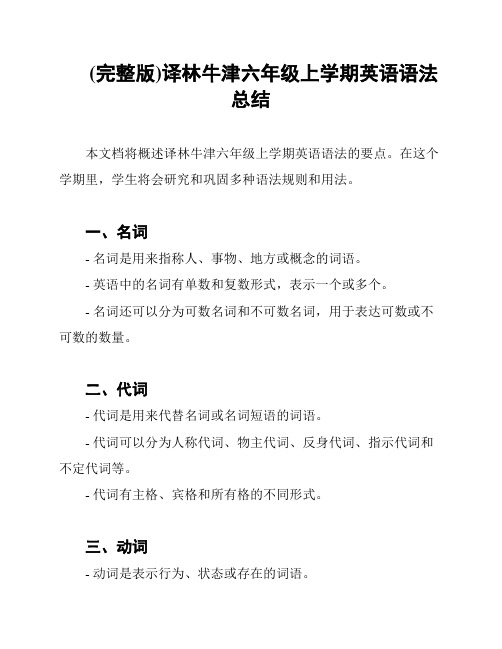
(完整版)译林牛津六年级上学期英语语法
总结
本文档将概述译林牛津六年级上学期英语语法的要点。
在这个学期里,学生将会研究和巩固多种语法规则和用法。
一、名词
- 名词是用来指称人、事物、地方或概念的词语。
- 英语中的名词有单数和复数形式,表示一个或多个。
- 名词还可以分为可数名词和不可数名词,用于表达可数或不可数的数量。
二、代词
- 代词是用来代替名词或名词短语的词语。
- 代词可以分为人称代词、物主代词、反身代词、指示代词和不定代词等。
- 代词有主格、宾格和所有格的不同形式。
三、动词
- 动词是表示行为、状态或存在的词语。
- 动词有时态、人称和语态的变化形式。
- 动词可以用来表达现在、过去和将来的事件。
四、形容词和副词
- 形容词用于描述或修饰名词,表示特征或性质。
- 形容词可以有不同的级别,包括原级、比较级和最高级。
- 副词用于修饰动词、形容词或其他副词,表示程度、方式或时间等。
五、介词
- 介词用于表示位置、方向、时间和关系等。
- 介词通常与名词或代词连用,构成介词短语。
六、连词
- 连词用于连接词语、短语、句子或句子成分。
- 连词可以是并列连词、从属连词或关联连词。
七、句子
- 句子是由词语组成的表达完整意思的语言单位。
- 句子可以简单句或复合句,包括主语、谓语和宾语等要素。
以上是译林牛津六年级上学期英语语法的总结要点。
通过学习这些语法规则和用法,学生可以提高英语表达的准确性和流利度。
牛津英语译林版六年级上册第三单元Unit3知识点梳理.docx
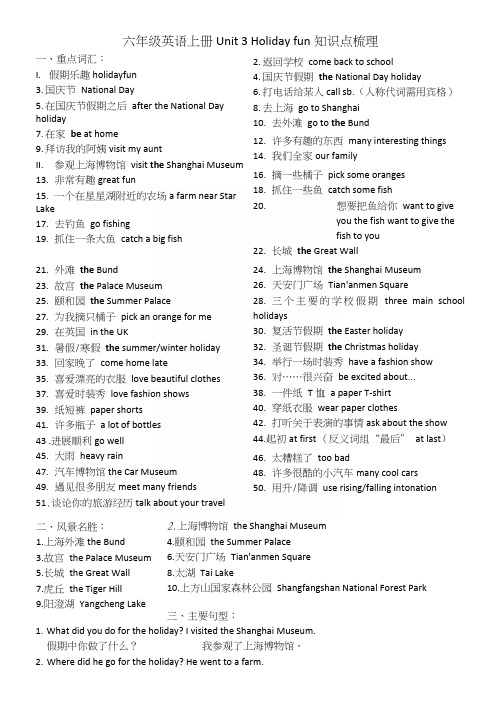
六年级英语上册Unit 3 Holiday fun 知识点梳理一、重点词汇: I. 假期乐趣holidayfun 3. 国庆节 National Day5. 在国庆节假期之后 after the National Day holiday7. 在家 be at home9. 拜访我的阿姨visit my auntII. 参观上海博物馆 visit the Shanghai Museum 13. 非常有趣great fun15. 一个在星星湖附近的农场a farm near Star Lake17. 去钓鱼 go fishing19. 抓住一条大鱼 catch a big fish 21. 外滩 the Bund23. 故宫 the Palace Museum 25. 颐和园 the Summer Palace 27. 为我摘只橘子 pick an orange for me 29. 在英国 in the UK31. 暑假/寒假 the summer/winter holiday 33. 回家晚了 come home late35. 喜爱漂亮的衣服 love beautiful clothes 37. 喜爱时装秀 love fashion shows 39. 纸短裤 paper shorts 41. 许多瓶子 a lot of bottles 43 .进展顺利go well 45. 大雨 heavy rain47. 汽车博物馆the Car Museum 49. 遇见很多朋友meet many friends 51.谈论你的旅游经历talk about your travel2. 返回学校 come back to school4. 国庆节假期 the National Day holiday6. 打电话给某人call sb.(人称代词需用宾格) 8. 去上海 go to Shanghai 10. 去外滩 go to the Bund12. 许多有趣的东西 many interesting things 14. 我们全家our family16. 摘一些橘子 pick some oranges 18. 抓住一些鱼 catch some fish 20.想要把鱼给你 want to give you the fish want to give the fish to you22. 长城 the Great Wall24. 上海博物馆 the Shanghai Museum26. 天安门广场 Tian'anmen Square28. 三个主要的学校假期three main school holidays30. 复活节假期 the Easter holiday 32. 圣诞节假期 the Christmas holiday 34. 举行一场时装秀 have a fashion show 36. 对……很兴奋 be excited about... 38. 一件纸 T 恤 a paper T-shirt40. 穿纸衣服 wear paper clothes42. 打听关于表演的事情ask about the show 44.起初at first (反义词组“最后” at last ) 46. 太糟糕了 too bad48. 许多很酷的小汽车many cool cars 50. 用升/降调 use rising/falling intonation2.上海博物馆 the Shanghai Museum4.颐和园 the Summer Palace 6.天安门广场 Tian'anmen Square 8.太湖 Tai Lake10.上方山国家森林公园 Shangfangshan National Forest Park 三、主要句型:1. What did you do for the holiday? I visited the Shanghai Museum. 假期中你做了什么? 我参观了上海博物馆。
牛津译林版小学六年级英语上册 Unit3 单元知识 总结
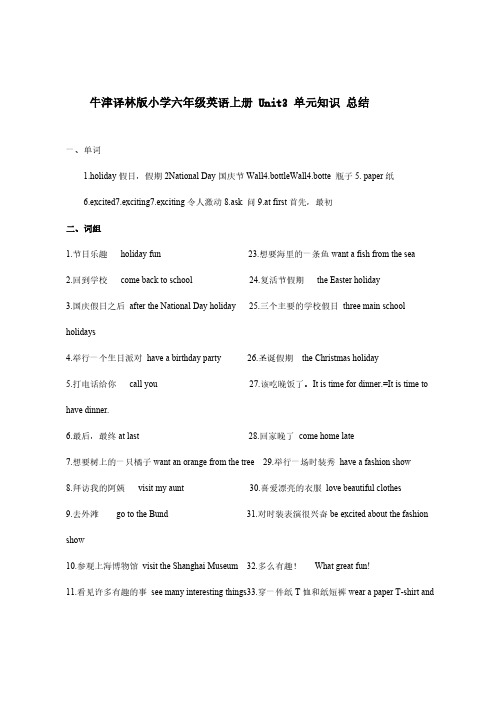
牛津译林版小学六年级英语上册 Unit3 单元知识总结一、单词1.holiday假日,假期2National Day国庆节Wall4.bottleWall4.botte 瓶子5. paper纸6.excited7.exciting7.exciting令人激动8.ask 问9.at first首先,最初二、词组1.节日乐趣holiday fun 23.想要海里的一条鱼want a fish from the sea2.回到学校come back to school 24.复活节假期the Easter holiday3.国庆假日之后after the National Day holiday 25.三个主要的学校假日three main school holidays4.举行一个生日派对have a birthday party 26.圣诞假期the Christmas holiday5.打电话给你call you 27.该吃晚饭了。
It is time for dinner.=It is time to have dinner.6.最后,最终at last 28.回家晚了come home late7.想要树上的一只橘子want an orange from the tree 29.举行一场时装秀have a fashion show8.拜访我的阿姨visit my aunt 30.喜爱漂亮的衣服love beautiful clothes9.去外滩go to the Bund 31.对时装表演很兴奋be excited about the fashion show10.参观上海博物馆visit the Shanghai Museum 32.多么有趣!What great fun!11.看见许多有趣的事see many interesting things33.穿一件纸T恤和纸短裤wear a paper T-shirt andpaper shorts12.遇见很多朋友meet many friends 34.询问某人有关某事ask sb. about sth.13.有趣的事great fun 35.穿着纸衣服wear paper clothes14.我们的家人our family 36.穿了许多瓶子wear a lot of bottles15.去农场go to a farm 37.打听有关表演的事ask about the show16.在星星湖边near Star Lake 38.进展顺利go well17.为我摘只橘子pick an orange for me 39.起初很完美。
牛津译林版六年级英语上册Unit6知识点汇总

牛津译林版六年级英语上册Unit 6 知识点整理汇总I词组1. live near/ far away from2. go to ... by bus / ferry / underground=take a(n) bus / ferry / underground to ... 3. go to ... on foot = walk to ...4. How long does it take sb. to do sth.?=How long do/does sb. spend (in) doing sth.?5.It takes sb. some time to do sth.=sb. spend(s) some time (in) doing sth.6.about half an hour7.one hour and a half=one and a half hours8.the amount of time9.an advertisement board10. a few department stores=some department stores11.a little pollution = some pollution12.a lot of = lots of 否认形式: not much / not many13.on the bus / train / underground14.in the car15.on one ’ s way to sp.16.one one ’ s way home / there/ here17.by light rail18.in the housing estate19.at the police station20.get to sp./ get there住的离近/远乘公交车 /渡轮 /地铁去某地步行去某地某人花多少时间做某事?某人花(时间)做某事大概半小时一个半小时时间的量一个广告牌一些百货商铺一些污染很多在公交车 /火车 /地铁上在小轿车里在某人去某地的路上在某人回家 /去那边 /来这儿的路上乘轻轨在居民区里在警察局抵达某地/ 到那边II. 词性变换1. travel v. (travelled, travelled, travelling)traveller n. 旅游者A traveler is a person who is on a trip or a person who travels a lot.旅游者是一个人正在旅游或许一个人旅游好多。
牛津译林版-英语-六年级上册--Unit1《The king’s new cloths》第一单元短语、词汇、知识点梳理 译林版

小学-英语-上册-打印版小学-英语-上册-打印版Unit1 The king’s new clothes 知识点梳理一、短语积累1. the king’s clothes 皇帝的新装2. long long ago 很久以前3. one day 有一天4. two men/women 两个男人/女人5. like new clothes 喜欢新衣服6. make…for 给……做7. visit the king 拜访国王8. show sth to sbshow sb sth 展示给……看 9. try on these magic clothes 试穿这些魔力衣服10. clever / foolish people 聪明/愚蠢的人 a lot of/lots of/many people 许多人 11. walk through the city 步行穿过这座城市 12. look at 看…… 13. in the street 在街上 14. shout at 向…..大喊 15. a little boy 一个小男孩 16. point at 指着 17. laugh at 嘲笑 18. in the new clothes wear the new clothes 穿着新衣服 wear yellow 穿黄色的衣服 19. fit well 很适合 20. get…from 从……得到21. come to my party 来参加我的聚会 22. at half past four 在四点半23. an American cowboy 一个美国的西部牛仔 24. a Scottish man 一个苏格兰男人 25. wear jeans 穿着牛仔裤wear a kilt 穿苏格兰短裙 26. play a game/play games做游戏,玩游戏27. tell a story/tell stories 讲故事 28. each/every student 每一个学生 29. say one sentence 说一个句子 30. on the mountain 在山上 31. the next sentence 下一个句子 32. live in 居住在33. Bobby’s turn 博比的机会 34. What’s next? 接下来呢? 35. think hard 冥思苦想 36. have to 不得不,必须 37. start …again 重新开始 38. in the forest 在森林里 39. in front of 在……前面 40. by the house 房子附近41. pick a flower/pick flowers 摘一朵花 42. be angry 生气的 43. pick up 捡起,拾起44. give me your child 把你的孩子给我 45. be nice to her (宾格)对她很好 46. live with the lion 和狮子住在一起 47. look after 照顾48. turn into a prince 变成一个王子小学-英语-上册-打印版49.What beautiful clothes! 多漂亮的衣服啊!二、重点句型、语法点拔1、there be结构在一般过去时的各种句型转换:There be结构的组成:There be + 名词短语+方位短语.(数量词+名词)(1)肯定句:e.g.: Long long ago, there was a king. /There were a lot of people in the street.(2)否定句:在be动词was或were后+not, some要改成any.e.g.: There were some people in the street.(否定句)There were not any people in the street.(3) 一般疑问句及其肯定和否定回答:e.g.: A: Was there a house on the mountain?B: Yes, there was. / No, there wasn’t.(4)有关there be的特殊疑问句的问答:A1:What was in front of the lion’s house?(针对名词短语提问)B1: There were some flowers .A2: How many houses were there on the mountain?(针对数量词提问)B2: There was one.2、动词在一般过去时中的变化:a、be动词在一般过去时中的变化:was/were.其中Checkout time中的circle and say进行了重点操练。
- 1、下载文档前请自行甄别文档内容的完整性,平台不提供额外的编辑、内容补充、找答案等附加服务。
- 2、"仅部分预览"的文档,不可在线预览部分如存在完整性等问题,可反馈申请退款(可完整预览的文档不适用该条件!)。
- 3、如文档侵犯您的权益,请联系客服反馈,我们会尽快为您处理(人工客服工作时间:9:00-18:30)。
知识点归纳班级: 姓名:句子时态归纳一、一般现在时(句子中通常有always,usually,often,sometimes,never,every…, on Mondays/…)1、句型结构:主语+V、(s)如果主语就是三单,谓语动词加s或者es、例如:Helen likes listening to music、My sister has a toy cat、如果主语不就是三单,谓语动词用原形。
例如:I like listening to music、I have a toy cat、2、动词+s/es形式(1)一般动词后加s 如reads(2)以s、x 、ch、sh 结尾,加es 如watches(3)以辅音字母+o 结尾,一般加es 如goes(4)辅音+y 结尾,变y为i ,再加es如worries、二、一般现在进行时(句子中通常有now,listen, look, 具体时间等)1、句型结构:主语+ be +V、ing例如:I am singing in the classroom、Liu Tao is reading in the bedroom、2、动词ing形式(1)一般情况直接加ing, play —playing(2)以不发音的“e”结尾,去“e”加ing,skate —skating(3)双写词尾字母加ing,sit—sitting, swim—swimming, run—running,put—putting, get—getting, begin—beginning,shop—shopping, stop—stopping三、一般过去时(句子中通常有just now,…ago,yesterday,last…, before等)1、句型结构:主语+ V、ed谓语动词加ed(不规则动词:go-went,come-came等)例如:I listened to music last night、Liu Tao went to the zoo yesterday、2、动词ed形式(1)一般情况直接+ede、g、play – played(2)闭音节单词双写末尾单词+ede、g、stop – stopped, shop – shopped(3)原形与过去式同型e、g、read-read,hit-hit, put-put,let-let,cut-cut,lose—lost(4)以辅音+y结尾去y变i+ede、g、copy-copied,cry-cried,study-studied,become-became(5)不规则动词的过去式is-was am-was are-were do-did can-could begin-began bring-brought buy-bought catch-caught teach-taughtchoose-chose come-came get-got draw-drew keep-keptdrive-drove eat-ate find-found fly-flew forget-forgothear-heard give-gave go-went grow-grew have-haddrink-drank try--tried know-knew learn-learnt/learned make-madesend-sent meet-met hold--held wear--wore ride-rodering-rang run-ran say-said see-saw shall-shouldsing-sang sit-sat sleep-slept speak-spoke spend-spentstand-stood sweep-swept swim-swam take-took teach-taught 四、一般将来时(句子中通常有tomorrow,next…,soon,this afternoon,this evening)谓语动词结构就是:be going to +do(表示计划、打算做…) 或者will +do(表示即将发生…)句型结构:主语+ be going to / will + V、原形例如: I am going to have an English lesson tomorrow、He will have an English lesson tomorrow、动词使用1、用动词原形(1)情态动词:can,can’t ,should,shouldn’t,must,mustn’t,could,couldn’t,will,won’t 后面用动词原形,(2)助动词do,don’t, does,doesn’t,did,didn’t后面用动词原形。
(3)let,help 后面用动词原形2、动词加inglike doing, love doing, go doing, finish doing, stop doingNo doing(禁止做某事e、g、No eating or drinking、)介词(be good at,about,for)后面动词加ing等3、加to加动词原形want to do,would like to do,have to do(不得不做某事),be going to do ,how to do(怎么样做某事),it’s time to do(…的时间到了), forget to do…(忘记做……), remember to do(记得做…),try to do (试着做…),use/reuse to do(用/再利用…做…),主格,宾格,形容词性物主代词主格宾格形物我(的) I me my我们(的) we us our您(的) you you your您们(的) you you you她(的) he him his她(的) she her her它(的) it it its她们(的) they them their动词与介词后用宾格:动词如:help( help me) / let (let us) / make (you) …介词如:for(me) / from(him) /to (you) …名词使用1、a lot of,lots of,some,a few,many,how many后面加可数名词复数,a lot of,lots of,some,a little,much,how much后面加不可数名词。
2、可数名词与不可数名词的分类可数名词不可数名词sweet(s), cake(s), ice cream(s), egg(s),noodle(s), hamburger(s), sandwich(es),hot dog(s), lollipop(s), sausage(s), steamed bun(s), vegetable(s), carrot(s), bean(s), tomato(es), potato(es), apple(s), pear(s), peach(es), mango(es), grape(s)…water, milk, juice, coffee, cola, tea, soup, porridge, cereal, rice, bread, meat…3、名词单复数(1)一般情况,+s(2)名词以s、x、sh、ch结尾,+es(3)名词以“o”结尾,有生命的+es (如potato —potatoes);无生命的+s(如photo —photos)(4)名词以“y”结尾,元音(a,e,i,o,u)+y结尾——直接+s;辅音+y结尾——去y变i+es(5)名词以“f”/“fe”结尾,去f/fe变ve+s(6)特殊:man——men, tooth——teeth,foot——feet,child——children形容词,副词1、形容词用于修饰名词:He is a happy boy、副词用于修饰动词:He always sing happily、2、连系动词用形容词修饰:be动词(is, am, are), look, feel, keep, smell, taste, sound, get, become, make…举例:look happy, feel good, keep healthy, smell nice, taste good, sound good, become sunny3、形容词到副词的变化规律形容词副词形容词副词形容词副词一般情况直接+ly 特殊变化辅音+y结尾, 去y变i +lybeautiful beautifully good well happy happilycareful carefully 形容词、副词同形angry angrilyloud loudly high high easy easilybad badly fast fast busy busilyexcited excitedly early early heavy heavilyquiet quietly late latequick quicklyslow slowlysad sadly动词变职业名词1、动词+er/r结尾:play --- player, teach --- teacher, sing --- singer, work --- worker,clean --- cleaner, drive --- driver, write --- writer, dance --- dancer,paint --- painter,love --- lover, travel --- traveller2、+orvisit --- visitor3、-ist结尾:piano --- pianist,science --- scientist, art --- artist,牙医dentist4、- man结尾:post --- postman, milk --- milkman, space --- spaceman, fire --- fireman___5、男/女职业:police --- policeman(男),police --- policewoman(女)act --- actor(男), act --- actress(女)wait --- waiter(男), wait --- waitress(女)6、医生doctor,护士nurse,农民farmer,宇航员astronaut7、China中国-Chinese中国人America美国-American美国人France法国-French法国人the UK英国-British英国人England英国- English英国人Australia澳大利亚- Australian澳大利亚人Japan日本- Japanese 日本人the US/ America美国- American 美国人句型转化一、一般疑问句做法:(1)有Be动词(am\is \ are\was\were)时,将Be动词提到句首,剩余部分照抄;(2)有情态动词can/would/must/will/should时,将can/would/must/will/should提到句首,剩余部分照抄;(3)没有Be动词(am\is \ are\was\were)与情态动词can/would/must/will/should时,句首用助动词do/does/did;(4)注意点:I变you, my 变your, us变you, me变you, our 变your、some变any二、否定句(1)在句中的动词am\is \ are\was\were或can/would/must/will/should后面加not、或(2)如果没有am\is \ are\was\were或can/would/must/will/should就在动词前加don’t, doesn’tdidn’t、三、划线部分提问:根据划线内容找到疑问词。
